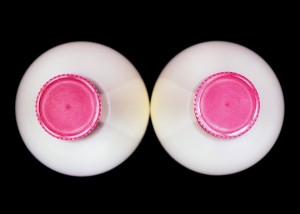June 14th, 2011 by IsisTheScientist in Health Tips
1 Comment »

I think one of the greatest public safety advances of the last 15 years has been the widespread installation of automated external defibrillators (AEDs). Automated external defibrillators are medical devices designed to deliver an electrical shock to the heart in ventricular fibrillation – a cardiac rhythm that is commonly associated with cardiac arrest.

Figure 1: ECG of a heart devolving into ventricular fibrillation.
I was working in emergency medicine when medical device companies first began to advocate for the placement of AEDs in public places and worked closely with many companies, organizations, and government agencies to incorporate AEDs into their emergency response plans. This wasn’t an easy sell in the late 1990s. People were worried about safety, liability, and cost. But, AED programs have been a great success. AEDs are most effective when they are used within 3-5 minutes of arrest. For example, if you have a cardiac arrest with ventricular fibrillation in New York City, Read more »
*This blog post was originally published at On Becoming a Domestic and Laboratory Goddess*
June 13th, 2011 by Elaine Schattner, M.D. in Health Tips, Opinion
No Comments »

The June issue of Wired carries a feature on the Booming Market for Human Breast Milk. You can read about the under-the-counter and over-the-Internet sale of “liquid gold” with a typical asking price in the range of $1 to $2.50 an ounce.
Here’s a taste, from the article:
…“rich, creamy breast milk!” “fresh and fatty!”… Some ship coolers of frozen milk packed in dry ice. Others deal locally, meeting in cafés to exchange cash for commodity…
Late last year, the FDA issued a warning about feeding your child human milk from strangers. Still, the stuff’s barely regulated.

milk containers, Wired Magazine, June 2011
As much as I think it’s a good idea for women to breast feed their babies as best they can, I was pretty shocked to learn about this unregulated industry. Mainly because if a woman who donates milk is infected with a virus, like HIV or HTLV-1, the milk often contains the virus. The infant can absorb the virus and become infected. Feeding human breast milk from an unknown donor is kind of like giving a child a blood transfusion from a stranger, unchecked by any blood bank.
I’m not sure why Wired ran this story, which is admittedly interesting. Maybe it’ll push the FDA to take a more aggressive stance on this matter, as it should.
*This blog post was originally published at Medical Lessons*
May 27th, 2011 by RamonaBatesMD in Health Tips
No Comments »

Last year I didn’t write about dog bite prevention until the first week of June even though I know National Dog Bite Prevention Week is always the third full of week of May.
The numbers shared by the American Veterinary Medical Association (AVMA) haven’t changed: 4.7 million people are bitten by dogs each year in the US with 800,000 of them requiring medical attention.
 If you have read this blog for very long, you know I dearly love my dogs — deceased ones (Columbo, Ladybug (photo), and Girlfriend) and the living one, Rusty. Still, I have no illusions that dogs bite and given the right provocation, I think mine would though most of the time they are totally harmless and would just invite you in to rob me.
If you have read this blog for very long, you know I dearly love my dogs — deceased ones (Columbo, Ladybug (photo), and Girlfriend) and the living one, Rusty. Still, I have no illusions that dogs bite and given the right provocation, I think mine would though most of the time they are totally harmless and would just invite you in to rob me.
Sadly, children are by far the most common victims of dog bites, occurring most often in children 5-9 years of age. Senior citizens are the second most common dog bite victims.
Children are also more likely to be severely injured and represent half of the dog-bite victims requiring medical attention every year. Almost two thirds of injuries among children Read more »
*This blog post was originally published at Suture for a Living*
May 17th, 2011 by DrCharles in Health Tips
No Comments »

 A fever in an infant can be the first sign of an illness. While a rise in body temperature above 100.4 degrees Fahrenheit is part of a healthy immune system response, it does signal potential danger and need for further evaluation. Since a reading may lead to a call or visit to the child’s doctor or emergency room, accuracy is key. What is the best type of infant thermometer?
A fever in an infant can be the first sign of an illness. While a rise in body temperature above 100.4 degrees Fahrenheit is part of a healthy immune system response, it does signal potential danger and need for further evaluation. Since a reading may lead to a call or visit to the child’s doctor or emergency room, accuracy is key. What is the best type of infant thermometer?
A digital rectal thermometer.
This is according to such authorities as the American Academy of Pediatrics, Consumer Reports, and the American Academy of Family Physicians.
The definition of a fever is important as well. According to the AAFP:
A normal temperature is about 98.6°F (37°C) when taken orally (in your child’s mouth) and 99.6°F (37.5°C) when taken rectally (in your child’s bottom). Many doctors define a fever as an oral temperature above 99.5°F (37.5°C) or a rectal temperature above 100.4°F (38°C). Read more »
*This blog post was originally published at The Examining Room of Dr. Charles*
May 11th, 2011 by PhilBaumannRN in Opinion
No Comments »

My son has always loved books. They were among his first objects his eyes fascinated and focused on. He’s learning to read right now and his love of books remains as strong as it was in his infancy.
It’s clear that books – the traditional kind: made of paper and ink and labor – are being replaced by digital media. The Kindle and the iPad and other tablets are making it easier to acquire and consume material once only available on books.
For children today, the iPad is very intuitive. In fact, some parents have reported that their children have become so used to the iPad screen, that they “pinch” pages in books – expecting them to zoom-out.
Perhaps some parents believe we can let books go and just let our kids skip them in favor of digital media without any cost. They *may* be right. Or they may not.
As for me, books are still a critical foundation for civilization.
Neurons are amazing things: the more they’re used, the better they get (generally). So as a child grows, the more exposure they get to different kinds of learning and feeling and experiences, the healthier their brains grow. Read more »
*This blog post was originally published at Phil Baumann*



















